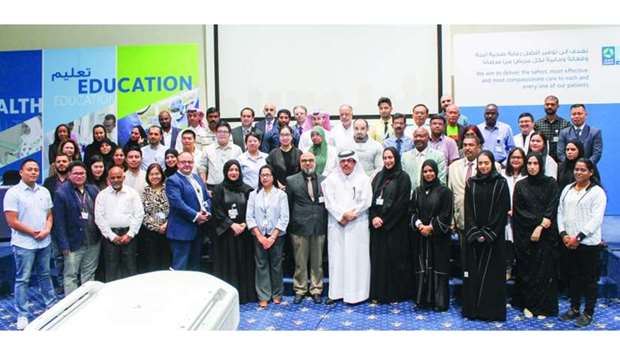Hamad Medical Corporation (HMC) recently joined organisations across the country, including the Ministry of Public Health, Ministry of Municipality and Environment, Qatar Foundation (QF), and Qatar Petroleum, in recognising Qatar’s Environment Day.
Celebrated on February 26 each year, Qatar’s Environment Day, was created as part of the country’s ongoing efforts to preserve and protect the environment for present and future generations. It forms part of sustainability goals set out in the Qatar National Vision 2030.
The annual event also provided an opportunity for HMC to acknowledge and highlight its ongoing efforts to promote a clean environment, ensuring its hospitals to be a place of health, healing, and tranquility for employees, patients, and visitors.
HMC also hosted an awareness workshop on responsible management of waste and the associated global challenges to mark Qatar’s Environment Day.
Health Facilities Development chief Hamad Nasser al-Khalifa and Occupational Health and Safety (OHS) Department executive director Dr Huda al-Naomi, who were among the workshop speakers, discussed a variety of topics, including the increasing volume of waste produced globally. According to the speakers, annual global waste production is increasing at an alarming rate and if the current pace continues, the earth’s surface will be unable to accommodate the population's waste disposal needs. Workshop participants also discussed the importance of world leaders supporting environment goals and being part of the solution, noting that waste management issues are closely linked to other global dilemmas such as poverty, the adequate provision of public health services, overconsumption of resources, and climate change.
The sessions also tackled better management of waste, which would help in resolving these dilemmas. Mishal al-Kuwari, who represented QF at the workshop, shared his organisation’s experience on responsible waste management. He said the rapidly developing infrastructure sector in Qatar has led to a large increase in construction and demolition waste, which he indicated to account for half of the waste produced in Qatar.
Al-Kuwari said that QF conducted a number of studies in this area and launched several initiatives geared toward reducing the production of single-use plastic containers such as replacing non-biodegradable water bottles with more eco-friendly containers; non-biodegradable water bottles can take up to 500 years to decompose in landfills. More than 70 healthcare workers attended the workshop, which also saw active participation of Maryam al-Humaidi and Noaf al-Karbi, two young Qatari environmentalists.
HMC’s OHS Department organised the workshop as part of ongoing collaborations with community partners to host lectures and other training opportunities for staff.
The annual event also provided an opportunity for HMC to acknowledge and highlight its ongoing efforts to promote a clean environment, ensuring its hospitals to be a place of health, healing, and tranquility for employees, patients, and visitors.
HMC also hosted an awareness workshop on responsible management of waste and the associated global challenges to mark Qatar’s Environment Day.
Health Facilities Development chief Hamad Nasser al-Khalifa and Occupational Health and Safety (OHS) Department executive director Dr Huda al-Naomi, who were among the workshop speakers, discussed a variety of topics, including the increasing volume of waste produced globally. According to the speakers, annual global waste production is increasing at an alarming rate and if the current pace continues, the earth’s surface will be unable to accommodate the population's waste disposal needs. Workshop participants also discussed the importance of world leaders supporting environment goals and being part of the solution, noting that waste management issues are closely linked to other global dilemmas such as poverty, the adequate provision of public health services, overconsumption of resources, and climate change.
The sessions also tackled better management of waste, which would help in resolving these dilemmas. Mishal al-Kuwari, who represented QF at the workshop, shared his organisation’s experience on responsible waste management. He said the rapidly developing infrastructure sector in Qatar has led to a large increase in construction and demolition waste, which he indicated to account for half of the waste produced in Qatar.
Al-Kuwari said that QF conducted a number of studies in this area and launched several initiatives geared toward reducing the production of single-use plastic containers such as replacing non-biodegradable water bottles with more eco-friendly containers; non-biodegradable water bottles can take up to 500 years to decompose in landfills. More than 70 healthcare workers attended the workshop, which also saw active participation of Maryam al-Humaidi and Noaf al-Karbi, two young Qatari environmentalists.
HMC’s OHS Department organised the workshop as part of ongoing collaborations with community partners to host lectures and other training opportunities for staff.

